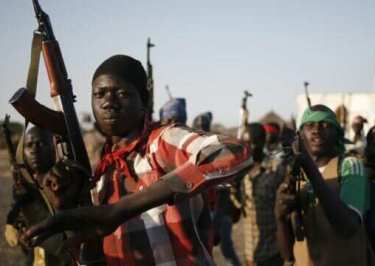South Sudanese rebels oppose deployment of regional force
November 12, 2014 (ADDIS ABABA) – South Sudan’s armed opposition group led by former vice-president, Riek Machar, said they are opposed to regional troops deployment to the country, saying this could attract a regional war and prolong the suffering of the people in the war-torn region.

The statement also threatened sanctions ranging from assets freezes, travel bans within the region and arms embargos, as well as denying access to other unspecified materials that can be used in war.
The summit held in the Ethiopian capital, Addis Ababa, where the IGAD-mediated peace talks had been ongoing for the last 10 months, was also attended by president Kiir and chairman Machar.
Regional leaders including the presidents and prime ministers of Kenya, Ethiopia, Sudan, Djibouti, Somalia and Uganda were in attendant.
The regional body threatened to take such military measures without any further consultations with the belligerent parties and called on the United Nations and the international community to support such incoming measures.
“Further, the IGAD region shall, without further reference to the warring Parties, take the necessary measures to directly intervene in South Sudan to protect life and restore peace and stability,” partly reads the statement.
REBELS REJECT TROOP DEPLOYMENT
However, the armed opposition faction of the Sudan People’s Liberation Movement (SPLM-in-Opposition) said such deployment of regional troops would further complicate and widen the war.
“We believe this is not a wise decision. Regional troops’ deployment will complicate and further widen the scope of the war. It will likely attract a regional war,” Machar’s spokesperson James Gatdet Dak told Sudan Tribune in an exclusive interview on Wednesday.
He said it was understandable that some IGAD member states have conflicting interests in South Sudan, but added that pursuing such interests using a military option was not a wise path to try to safeguard their interests.
Dak in particular criticised the regional body for trying to repeat the mistake in which it allowed Uganda army to intervene militarily in the internal conflict.
He lamented that IGAD should have learnt from the interference by the Ugandan troops, saying the Uganda People’s Defence Forces (UPDF) scenario has only contributed to “more deaths and prolonged the war and the suffering of the people of South Sudan.”
“What have the Ugandan troops achieved so far? Keeping the dictator in power, maybe, and spreading the war, killing and maiming more South Sudanese? Is this what the other IGAD member states want to join in,” he asked.
The opposition leader’s spokesman also blamed the regional body for “failing” to convince or force Uganda to withdraw its forces despite mediating a cessation of hostilities agreement which called on the Ugandan troops to leave South Sudan since January this year.
Ugandan government on many occasions however attempted to justify its interference, saying it averted collapse of Salva Kiir’s leadership when the rebels captured the Jonglei state’s capital, Bor, defeating the South Sudan’s army and threatening to capture the nation’s capital, Juba, in January.
The southern neighbour deployed thousands of troops backed by its air power, tanks and other armoured vehicles in which they participated in fierce combats on Bor-Juba road on the side of president Kiir’s forces.
But Dak said there was no reason to continue to protect Kiir’s leadership particularly after his “coup attempt narrative failed and proven to be a ploy he used to start the war.”
He added that the region and the international community should instead punish Kiir and force him to step down after it was now understood that he unnecessarily started the war.
Tens of thousands of people have died, 1.8 displaced and 4 million others threatened by hunger.
The two principal leaders, Kiir and Machar, agreed on most of the power-sharing issues, according to IGAD officials.
There are however unclear versions as to which power-sharing items were agreed or not agreed between president and prime minister, or whether the leadership structure during a transitional period should include positions of vice president and two deputies to the prime minister.
IGAD officials expressed mixed feelings about how the two parties may be close to an agreement and end the fighting.
“My understanding is that the leaders are determined to make progress as they see this as a pivotal stage in the negotiations,” said Manoah Esipisu, spokesperson for the Kenyan presidency.
“But it is, as expected, a difficult process,” he added.
(ST)
